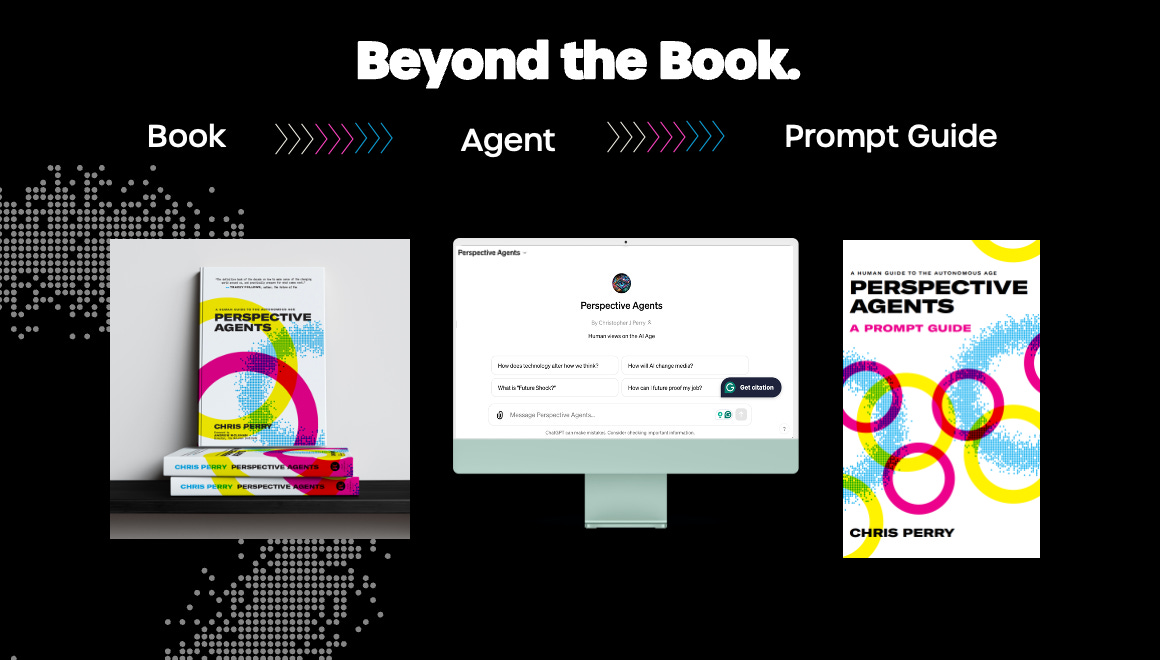I've slacked on posting here due to heavy demands for AI consulting. In 30 years on the innovation beat, I’ve never seen such a tsunami of excitement, apprehension, and confusion surrounding a technology movement.
This widespread curiosity, exemplified by OpenAI boasting 180 million users, contrasts sharply with the adoption I've observed in business and academia. Despite the buzz, the vast majority I meet with still don’t use generative AI as standard practice.
They don’t realize that, when used well, generative AI can be a superpower for thinking, research, and good writing. Personal and organizational know-how is still very underdeveloped.
I've just augmented my book about AI to help address this gap. Using and thinking about generative AI requires building new things that embody it. So now Perspective Agents is a multimedia platform.
It mixes the book's contents, a topic-specific agent trained on it (Perspective Agents GPT), and a collection of tailored prompts (via a new Perspective Agents Prompt Guide).
This mix can help you quickly learn how to interact with a topical agent.
You'll also extract the implications of AI for media, politics, leadership, and more.
It’s as simple as dropping prompts from the doc into the GPT and seeing where it takes you.
Insights from it can be career-altering. A common theme in working with clients is focusing on the application (how do I use this thing constructively?) rather than the implications (how will AIs alter how I work, what I work on, and how I find an edge in doing so?).
This new book-as-agent platform allows you to simultaneously work through the application and implications of generative AI.
The prompt guide is the essential element. It's a reading accelerator divided into several sections. Each focuses on a core aspect of the AI revolution underway, including:
Cause of Change: To understand this transition, you need a general understanding of what's driving it. A cursory overview of the tech, how it’s proliferating, and ways it alters media forms is the start.
Human Effects: Prevailing AI conversations centers on the growing power of language models, the potential of an all-knowing AI (AGI), and what it means for jobs. The human impact is far more far-reaching, with incredible potential and cautions to consider.
Future Impact: You must go beyond surface commentary to understand where AI may take us. In the case of jobs, routine tasks will be displaced and automated. However, AI will create new roles and skills that need to be mastered, like prompting. As noted in Perspective Agents, one report suggests that 85 percent of jobs in an AI age have yet to be invented. The agent can help you see what’s coming around the corner.
Actions to Consider: Understanding a situation is only useful if you apply what you've learned. The agent and guide will prompt you to envision what it will be like to live in this uncertain future, risks and immense potential in front of you. It's time to take action and prepare for the revolution underway.
For the price of a cup of coffee and a few hours of study, you can boost your understanding of what feels like overwhelming stuff.
The custom agent is live on OpenAI's ChatGPT Store. You can access and download the Perspective Agents prompt guide here.
A Gateway to New Ways of Thinking
Getting practical, the project is based on feedback from people I've met who are struggling to effectively use agents like ChatGPT.
If there's a central insight to take away, it's this:
Contrary to popular belief, success with generative AI doesn't require technical expertise; it rewards curious, thoughtful, and skilled writing.
Steven Johnson, the best-selling author and creator of Google's NotebookLM, goes so far as to say we’ve entered a ‘golden era’ for writing. In his Substack, "The Revenge of the Humanities," he says:
The simple fact of the matter is that interacting with the most significant technology of our time—language models like GPT-4 and Gemini—is far closer to interacting with a human, compared to how we have historically interacted with machines.
If you want the model to do something, you just tell it what you want it to do, in clear, persuasive prose. People who have command of clear and persuasive prose have a competitive advantage right now in the tech sector, or really in any sector that is starting to embrace AI.
Communication skills have always been an asset, of course, but thanks to language models they are now a technical asset, like knowing C++ or understanding how to maintain a rack of servers.
The models Johnson refers to can be extraordinary tools for strategists of all stripes. Some are for general purposes, like ChatGPT or Claude Opus. Others are topic-specific, like the one I built to accompany the book.
We will soon see an influx of new, specialized models-as-agents that fundamentally change how we interact with knowledge. Their proliferation will have far-reaching effects on business, media, and education.
Non-Fiction Reading May Never Be the Same
Mastering the art of the prompt unlocks a model’s potential, which is why prompt engineering quickly emerged as a cottage industry. While the web is overloaded with online tutorials and classes, it’s better to apply learning interactions to a specific area, like content captured in a book.
I’ve found that limiting your scope of interaction with models tends to get more out of them. So imagine having an AI assistant join you while reading a challenging text like Thomas Piketty’s “Capital in the Twenty-First Century.” The 696-page analysis examines wealth and income inequality over the past 250 years, arguing that unchecked capitalism leads to an increasing concentration of power.
A companion agent can answer questions about his economic theories, highlight connections to current events, or offer historical data to challenge Piketty's points.
Researching this way requires a particular way of thinking, writing, and judgment. It's not about simply feeding the AI a question and accepting its response; it's about engaging in a dialogue, refining your queries, and pushing for clarity.
Using generative AI to broaden perspectives requires quality observation, a way of looking, and a style of inquiry.
Prompts alone aren’t shortcuts to insight. It’s a magnifying glass. If your mind is dull and your questions are vague, what you’ll get back is equally obscure, just amplified.
Author and futurist Arthur C. Clarke stated, “Any sufficiently advanced technology is indistinguishable from magic.” In the case of generative AI, you capture the magic not with blind acceptance of responses but through base knowledge of a subject mixed with critical thought.
The AI revolution isn’t a spectator sport. To understand its power, you have to regularly use it. Perspective Agents as a platform is a way to learn how to speak with machines and realize the game-changing value that can come from it.
Check out Perspective Agents in its new form. I'm curious to hear your feedback once you've jumped in.





The journey towards artificial general intelligence is more akin to a voyage rather than a destination, but I believe that an Agent can help us take a small yet solid step on this long and arduous journey.